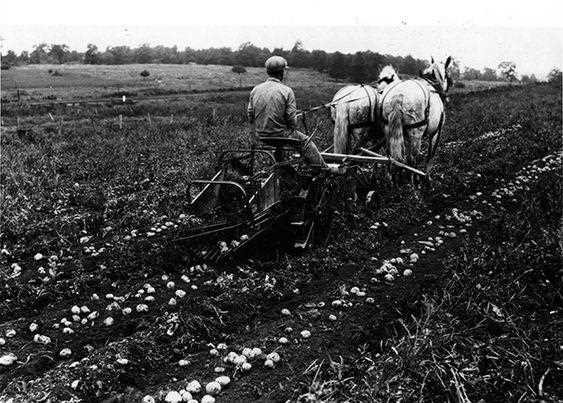The Industrial Revolution of the late 18th and 19th centuries marked a significant shift in farming practices. With new technologies and innovations, farming changed dramatically in the years that followed.
One of the most significant changes to farming during the Industrial Revolution was the development of new technologies. The invention of the steam engine allowed for the use of mechanized labor, which was faster and more efficient than hand labor. This allowed farmers to cultivate larger areas of land in less time and with greater precision. The invention of the tractor revolutionized the transportation of goods, allowing for a faster and more efficient way of transporting products to market.
The introduction of new crops and animal breeds was another important way that farming changed during the Industrial Revolution. New varieties of grains, fruits, and vegetables were developed, allowing for a more diverse selection of crops and a greater variety of foods. Similarly, new breeds of animals were developed, which could be raised for their meat, milk, and wool.
The development of new fertilizers, pesticides, and herbicides also changed the way farming was done during the Industrial Revolution. These chemicals allowed for a much more efficient and effective way to fertilize crops and protect them from pests. This led to yields that were higher and more consistent than ever before.
The Industrial Revolution also led to changes in the way farmers sold their products. New methods of transportation and communication allowed for the rapid transport of goods from one place to another, allowing for farmers to reach new markets and sell their products more easily. With the development of the telegraph, farmers could now keep track of prices in distant markets and adjust their prices accordingly.

Here are just a few of the ways that farming changed as a result of the Industrial Revolution:
1. Mechanization: The creation of new engines, such as steam engines and gasoline engines, allowing for the mechanization of farming. This greatly increased the efficiency of farming operations and made it possible for farmers to cultivate and harvest more land.
2. Improved Crops: The introduction of new crop varieties, such as corn and potatoes, and improved breeding techniques made it possible for farmers to grow more and better crops. This increased the productivity of farms and made it possible for farmers to feed a growing population.
3. Fertilizers and Pesticides: The development of chemical fertilizers and pesticides made it possible for farmers to better protect their crops from pests and diseases. This improved crop yields and made farming more profitable.
4. Increased Yields: The use of new technologies, such as fertilizers and pesticides, combined with improved crop varieties, allowed farmers to get more out of their fields. This increased crop yields and made farming more profitable.
5. Improved Storage: The invention of new technologies, such as refrigeration and canning, made it possible for farmers to store their crops for longer periods of time. This made it possible for farmers to store their produce for later sale and increased the profitability of farms.
6. Improved Transportation: With the invention of the railroad and the steamboat, farmers were able to transport their products more quickly and efficiently. This allowed farmers to sell their products in distant markets and increased the profits of farming operations.
These are just a few of the ways that farming changed as a result of the Industrial Revolution. With the introduction of new technologies and innovations, farming became more efficient and profitable, leading to increased productivity and a higher quality of life for many people.